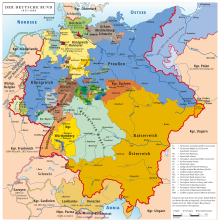Germany as a whole

As the whole of Germany was referred to in spite of the unconditional surrender in 1945 continuing, so far " Empire " general government mentioned that after the political merger of by the Potsdam Agreement and the East-West conflict divided Germany in the meantime resulting state partial orders (or institutions) in should replace a new all-German order.
Depending on the historical reference, the term describes either Germany with the inclusion of Austria (for example in the form of the German Confederation until 1866), Germany within the borders of 1937 (i.e. with the inclusion of the eastern territories of the German Empire ) or in summary the then Federal Republic of Germany , the GDR and Berlin .
With reference to ethnic and linguistic characteristics, the German-speaking parts of Europe or those who identify with Germany are also referred to as all-German . Correspondingly, the Viennese historian Heinrich von Srbik understood the term all-German as an alternative to both the small German , which was influenced by Prussia , and the greater German solution, which was influenced by Austria . Similarly, the early German national movement saw itself as all-German and was thus early in opposition to the particular interests of Prussia, Austria or the small German states.
The term is rarely used in the Federal Republic of Germany after reunification in 1990. Since then one speaks only of "Germany" or, if the aspect of unification is to be emphasized, of united or unified Germany.
literature
- Christoph Kleßmann : The double founding of the state. German history 1945–1955. Bonn 1991.
- Frank Liedtke, Karin Böke, Martin Wengeler: Leading political vocabulary in the Adenauer era. Walter de Gruyter, Berlin 1996, ISBN 3-11-014236-8 .
- Ute Röding-Lange: Names for 'Germany' in the time of the "turning point". Königshausen & Neumann, Würzburg 1997, ISBN 3-8260-1300-X .
supporting documents
- ↑ Johannes Seiffert : The greatest deceptions in history . edition berolina, Berlin 2016, ISBN 978-3-95841-044-2 .
- ^ Rainer Guldin: Political Landscapes: On the relationship between space and national identity . transcript, Bielefeld 2014, ISBN 978-3-8376-2818-0 , p. 163 .
- ↑ Thomas Nipperdey : German history 1800-1866: Citizens' world and strong state . Beck, Munich 2013, ISBN 978-3-406-65577-7 , pp. 307 .
- ↑ In the treaty on the final settlement with regard to Germany ( two-plus-four treaty ), which was signed in Moscow on September 12, 1990 and came into force on March 15, 1991, the former occupying powers waived (“Four Powers ") On their reservations and the Federal Republic, which is now understood as" united Germany ", was granted full sovereignty . See Art. 7 Para. 2 Two-plus-four contract; further cf. Hanns Jürgen Küsters : From the limited to the full sovereignty of Germany , in: From Politics and Contemporary History (APuZ), 17/2005 of April 25, 2005, Bonn, pp. 3–9.
- ↑ See declaration by the Federal Government on the treaty on the final regulation with regard to Germany by the Federal Minister for Foreign Affairs , Hans-Dietrich Genscher , on September 20, 1990, German Bundestag , plenary minutes, 11th legislative period, 226th session, p. 17803D; Knut Ipsen , Walter Poeggel (Ed.): The relationship of the united Germany to its Eastern European neighbors - to the historical, international law and political science aspects of the new situation. Scientific conference on the occasion of the 50th anniversary of the end of the Second World War (= Bochum writings on peacekeeping and international humanitarian law ; vol. 21). Brockmeyer, Bochum 1993, ISBN 3-8196-0177-5 .

